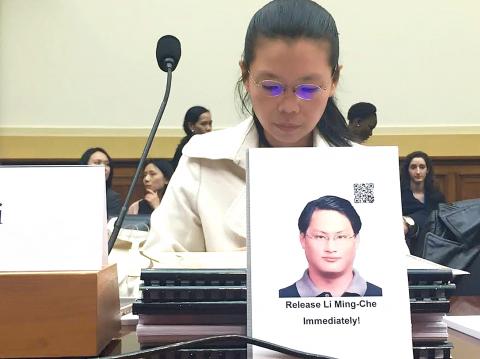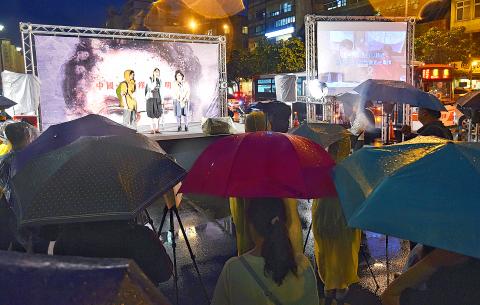Human rights groups yesterday gathered at the Liberty Square in Taipei, demanding that China immediately release Taiwanese human rights advocate Lee Ming-che (李明哲).
Lee was detained after entering Zhuhai City via Macau on March 19. He used to work for the Democratic Progressive Party and is currently a staff member at Wenshan Community College in Taipei, as well as a volunteer at the non-governmental organization Covenant Watch.
“We hope he will return soon,” Taipei Wenshan Community College president Cheng Hsiu-chuan (鄭秀娟) said.

Photo: courtesy of Shih Mi-na
The rally last night also sought to raise public awareness about forced disappearances.
“Lee’s wife, Lee Ching-yu [李凈瑜], declined the offer of help from human rights lawyers, because she believes her husband’s forced disappearance is an issue of human rights rather than a legal issue,” Cheng said. “There cannot not be any gray area between the two.”
Cheng said that people often joke that China has “held many Taiwanese hostages,” because of the large number of Taiwanese conducting business there, but she believes the nation would find a way to resolve the case without sacrificing its dignity.

Photo: Liu Hsin-de, Taipei Times
Taiwan Association for Human Rights secretary-general Chiu Ee-ling (邱伊翎) said that Beijing should clarify on what grounds it detained Lee Ming-che.
Even if China arrested Lee Ming-che according to the Law of the People’s Republic of China on the Administration of Activities of Overseas Non-Governmental Organizations within the Territory of China, Chinese authorities should not have detained him for more than 37 days, Chiu said.
Lee Ming-che had been detained for 61 days as of yesterday.
The 5 million Taiwanese visiting China each year must not turn a blind eye to the incident; otherwise, they would be acquiescing to China’s atrocities, which have not only infringed on the freedom of Taiwanese, but of international human rights advocates and academics, she added.
Covenant Watch chief executive officer Huang Yi-bee (黃怡碧) said her organization has sent a letter to German international law expert Eibe Riedel, who serves as a consultant for the German Commission for UNESCO, informing him of Lee Ming-che’s situation.
Riedel has forwarded the letter to the commission and 40 UNESCO ambassadors, Huang said, expressing the hope that UNESCO would use its influence to press China to release Lee Ming-che.
Meanwhile, Lee Ching-yu appeared on Thursday before a US House of Representatives committee hearing in Washington to appeal for help to secure her husband’s release.
She also pleaded for Washington to help preserve and enhance the human rights of Taiwanese in accordance with the Taiwan Relations Act (TRA).
Lee Ching-yu attended the hearing on forced disappearance, detention and torture in China along with the wives of three Chinese human rights lawyers who have also been detained.
Lee Ching-yu said in a statement that she had no choice but to seek help from the US, a country she described as “the leading democracy in the free world.”
“The US Congress has also voluntarily taken on the responsibility, as specified in section 2, clause 3 of the Taiwan Relations Act, to preserve and enhance the human rights of the people of Taiwan,” she said.
“Therefore, I stand alone before you today to plead for your help for my husband,” she said.
US Representative Chris Smith, who chaired the hearing of the subcommittee on global human rights, said Taiwan is an important democratic ally of the US, and a beacon of peace and democracy in Asia.
The US should continue its promises stated in the TRA and “six assurances,” which are the fundamental basis of Taiwan-US relations, he said.
After the hearing, Lee Ching-yu told reporters that she did not expect her husband to be released because of the hearing, but that being a human rights worker, one must believe in certain values and work hard to see them realized.
She said that as long as her husband remains in detention, she would do everything in her power to secure his release.

Tropical Storm Gaemi strengthened into a typhoon at 2pm yesterday, and could make landfall in Yilan County tomorrow, the Central Weather Administration (CWA) said yesterday. The agency was scheduled to issue a sea warning at 11:30pm yesterday, and could issue a land warning later today. Gaemi was moving north-northwest at 4kph, carrying maximum sustained winds near its center of up to 118.8kph and gusts of 154.8kph. The circumference is forecast to reach eastern Taiwan tomorrow morning, with the center making landfall in Yilan County later that night before departing from the north coast, CWA weather forecaster Kuan Shin-ping (官欣平) said yesterday. Uncertainty remains and

SEA WARNING LIKELY: The storm, named Gaemi, could become a moderate typhoon on Wednesday or Thursday, with the Taipei City Government preparing for flooding A tropical depression east of the Philippines developed into a tropical storm named Gaemi at 2pm yesterday, and was moving toward eastern Taiwan, the Central Weather Administration (CWA) said. Gaemi could begin to affect Taiwan proper on Tuesday, lasting until Friday, and could develop into a moderate typhoon on Wednesday or Thursday, it said. A sea warning for Gaemi could be issued as early as Tuesday morning, it added. Gaemi, the third tropical storm in the Pacific Ocean this typhoon season, is projected to begin moving northwest today, and be closest to Taiwan on Wednesday or Thursday, the agency said. Today, there would likely

DISRUPTIONS: The high-speed rail is to operate as normal, while several airlines either canceled flights or announced early departures or late arrivals Schools and offices in 15 cities and counties are to be closed today due to Typhoon Gaemi, local governments announced last night. The 15 are: Taipei, New Taipei City, Taoyuan, Tainan, Keelung, Hsinchu and Kaohsiung, as well as Yilan, Hualien, Hsinchu, Miaoli, Chiayi, Pingtung, Penghu and Lienchiang counties. People should brace for torrential rainfall brought by the storm, with its center forecast to make landfall on the east coast between tonight and tomorrow morning, the Central Weather Administration (CWA) said. The agency issued a sea warning for the typhoon at 11:30pm on Monday, followed by a land warning at 11:30am yesterday. As of

CASUALTY: A 70-year-old woman was killed by a falling tree in Kaohsiung as the premier warned all government agencies to remain on high alert for the next 24 hours Schools and offices nationwide are to be closed for a second day today as Typhoon Gaemi crosses over the nation, bringing torrential rain and whipping winds. Gaemi was forecast to make landfall late last night. From Tuesday night, its outer band brought substantial rainfall and strong winds to the nation. As of 6:15pm last night, the typhoon’s center was 20km southeast of Hualien County, Central Weather Administration (CWA) data showed. It was moving at 19kph and had a radius of 250km. As of 3pm yesterday, one woman had died, while 58 people were injured, the Central Emergency Operation Center said. The 70-year-old